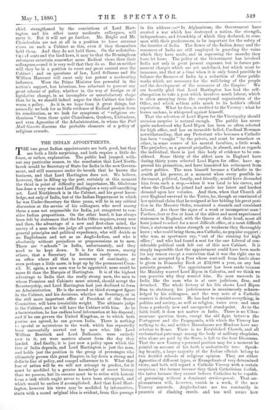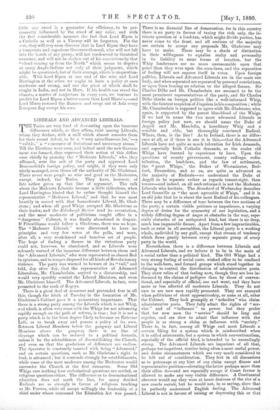THE INDIAN APPOINTMENTS.
THE two great Indian appointments are both good, but they are both a little surprising, and both require a little de- fence, or rather, explanation. The public had jumped, with- out any particular reason, to the conclusion that Lord North- brook would be Secretary of State for India in the new Govern- ment, and still murmurs under its breath that he knows the business, and that Lord Hartington does not. We believe, however, that in filling up the post, certainly at this moment the third in point of difficulty and importance, Mr. Gladstone has done a very wise and Lord Hartington a very self-sacrificing act. Lord Northbrook is in the Cabinet, and his great know- ledge, not only of India, but of the Indian Department in which he was Under-Secretary for three years, will be in any critical discussion at the service of his colleagues, who need among them a man not responsible for India, yet competent to con- sider Indian propositions. On the other hand, it has always been felt by statesmen that the India Office requires, every now and then, the advantage of a new and first-class mind, the survey of a man who can judge all questions with reference to general principles and political expediency, who will decide as an Englishman and not as an Anglo-Indian, and who is absolutely without prejudices or prepossessions as to men. There are "schools" in India, unfortunately, and they need to be kept down. It is for this reason, among others, that a Secretary for India so rarely returns to an office where all that is necessary of continuity, or even perhaps a little more, is kept up by the permanent Coun- cil. If, again, a new man was to be appointed, none could be more fit than the Marquis of Hartington. It is of the highest advantage to India that the really strong men, the men to whom Premiers and Cabinets must attend, should accept the Secretaryship, and Lord Hartington had just declined to form an Administration. He is the second or third strongest figure in the Cabinet, and his decisions, whether as Secretary, or in the still more important office of President of the Secret Committee, will have irresistible weight. The ultimate judge is the Cabinet, and he will have the Cabinet with him. As to ahninistration, he has endless local information at his disposal ; and if he can govern the United Kingdom, as to which both parties are agreed, he can govern India. There is nothing 8) special or mysterious in the work, which has repeatedly been successfully carried out by men who, like Lord William Bentinck and Lord Dalhousie, were entirely new to it, yet were masters almost from the day they landed. And finally, it is just now a policy upon which the fate of India depends, and Lord Hartington is just the man, and holds just the position in the group of personages who
ultimately govern this great Empire, to lay down a strong and definite line of policy, and compel adherence to it. What that line of action will be we will not attempt to predict, for it must be modified by a greater knowledge of secret history than we possess, but its essence must be to retire with honour flow a task which ought never to have been attempted, and which would be useless if accomplished. And that Lord Hart- ington, however his views may be modified by information, starts with a sound original idea is evident, from this passage in his address :—" In Afghanistan, the Government have created a war which has destroyed a nation, the strength, independence, and friendship of which they declared, in com- mon with their predecessors, to be important for the safety of the frontier of India. The flower of the Indian Army and the resources of India are still employed in guarding the ruins which they have made, and in repressing the anarchy they have let loose. The policy of the Government has involved India not only in great present expenses, but in future per- manent charges which are yet undefined, but which must be immense, and that at a time when it is only found possible to balance the finances of India by a reduction of those public works which are necessary for the well-being of the people and the development of the resources of the Empire." We are heartily glad that Lord Hartington has had the self- abnegation to take a post which involves much labour, which is often annoying from the exceptional organisation of the Office, and which seldom adds much to its holder's official reputation. What he does, is credited to the Viceroy ; what he leaves undone, is whispered against himself.
That the selection of Lord Ripon for the Viceroyalty should occasion surprise is natural enough. The public has never quite understood why Lord Ripon has been so often selected for high office, and has an incurable belief, Cardinal Newman notwithstanding, that any Protestant who becomes a Catholic has been "caught" by the priests, and must be somehow or other, in some corner of his mental faculties, a little weak. The prejudice, as a general prejudice, is absurd, and as regards the individual, there is just this body of evidence to be con- sidered. Some thirty of the ablest men in England have during thirty years selected Lord Ripon for office, have ap- proved his promotion, and have lamented his retirement from active politics. The man himself became a Catholic in the zenith of his powers, at a moment when every possible in- ducement., political, family, and friendly, would have dissuaded him from such a step,—when it was fatal to his career, and when the Church be joined had made her latest and hardest demand upon her votaries. And then, when that Church all over England swerved to the Tories, he, though so convinced of her spiritual claim that he resigned at her bidding his great posi- tion in the Masonic Order, remained a staunch and consistent Liberal. Are those the signs of a weak or incompetent man ? Further, four or five at least of the ablest and most experienced statesmen in England, with the Queen at their head, must all have joined to select for a most difficult office, at a most difficult time, a statesman whose strength or weakness they thoroughly knew ; who could bring them, as a Catholic, no popular support ; who was, as sportsmen say, "out of the running for high office ;" and who had found a seat for the one Liberal of con- siderable political rank left out of this new Cabinet. It is simply impossible that the appointment could have been made for any reason except a conviction that it was the right one to make, or accepted by a Peer whose rent-roll from lands alone is given in Domesday Book at £32,000 a year, on any but patriotic grounds. The appointment has been made because the Ministry wanted Lord Ripon in Calcutta, and we think we can perceive why they wanted him. No man succeeds in India like the man who is at once judicious, firm, and detached. The whole history of his life shows Lord Ripon firm to obstinacy, his judiciousness is unanimously acknow- ledged by his colleagues, and the very note of a Catholic convert is detachment. He has had to consider everything, in politics and society, as well as religion, twice over, and once from a perfectly new and unexpected stand-point. As to the faith itself, it does not matter in India. Them is no Ultra. montane question there, except the old fight between the Portuguese and the Propaganda, with which the Viceroy has nothing to do, and neither Mussulmans nor Hindoos have any relation to Rome. There is no Established Church, and all ecclesiastical patronage among the body of military chaplains, who alone are paid by the State, is left to the four Diocesans.
That the new Viceroy's personal position may for a moment be painful on account of his faith is undoubtedly true. Speak- ing broadly, a large majority of the Indian officials belong to two decided schools of religious opinion. They are either Agnostics of different types, or Evangelicals of very determined views, and both will regard a Catholic Viceroy with a certain suspicion ; the former because they think Catholicism foolish,
the latter because they cannot believe Catholics to be capable of governing without a dominant arriire-pensie. That un- pleasantness will, however, vanish in a week, if the new Viceroy succeeds. Angio-Indians are too constantly in presence of clashing creeds, and 'too well aware how
little any creed is a guarantee for efficiency, to be per- manently influenced by the creed of any ruler, and with the first considerable measure the fact that Lord Ripon is a Catholic as well as a Viceroy will be forgotten. For the rest, they will very soon discover that in Lord Ripon they have a temperate and sagacious Governor-General, who will not fall into the hands of any group, will not condescend to theatrical nonsense, and will not be shaken out of his convictions by that "cloud coming up from the North" which seems to deprive so many Anglo-Indians not only of their judgment, which might be questioned, but of their courage, which is unquestion- able. With Lord Ripon at one end of the wire and Lord llartington at the other, we ought to have a policy at once moderate and strong, and one the pivot of which shall be sought in India, and not in Merv. If his health can stand the climate, a matter of conjecture in every case, we venture to predict for Lord Ripon a better career than Lord Minto's,—and Lord Minto restored the finances and swept out of Asia every European flag except his own.



































 Previous page
Previous page